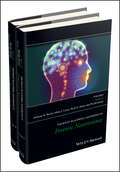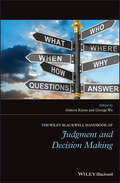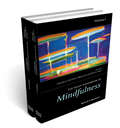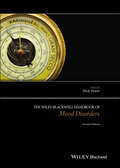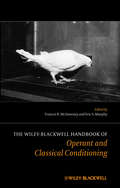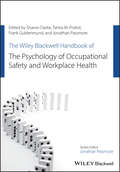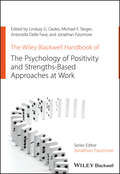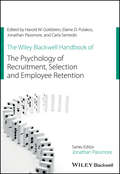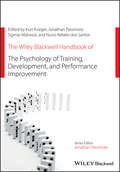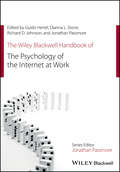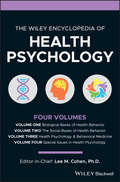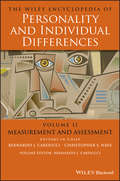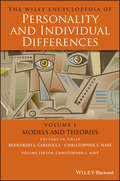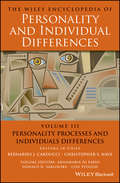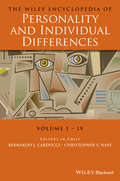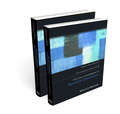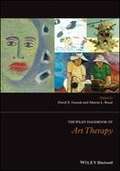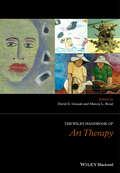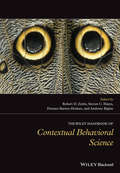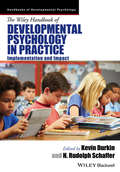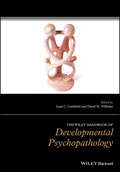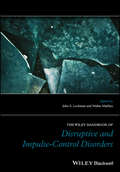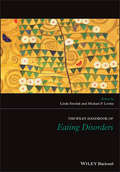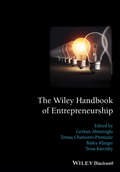- Table View
- List View
The Wiley Blackwell Handbook of Forensic Neuroscience
by Anthony R. Beech Adam J. Carter Ruth E. Mann Pia RotshteinExplores how the explosion of neuroscience-based evidence in recent years has led to a fundamental change in how forensic psychology can inform working with criminal populations. This book communicates knowledge and research findings in the neurobiological field to those who work with offenders and those who design policy for offender rehabilitation and criminal justice systems, so that practice and policy can be neurobiologically informed, and research can be enhanced. Starting with an introduction to the subject of neuroscience and forensic settings, The Wiley Blackwell Handbook of Forensic Neuroscience then offers in-depth and enlightening coverage of the neurobiology of sex and sexual attraction, aggressive behavior, and emotion regulation; the neurobiological bases to risk factors for offending such as genetics, developmental, alcohol and drugs, and mental disorders; and the neurobiology of offending, including psychopathy, antisocial personality disorders, and violent and sexual offending. The book also covers rehabilitation techniques such as brain scanning, brain-based therapy for adolescents, and compassion-focused therapy. The book itself: Covers a wide array of neuroscience research Chapters by renowned neuroscientists and criminal justice experts Topics covered include the neurobiology of aggressive behavior, the neuroscience of deception, genetic contributions to psychopathy, and neuroimaging-guided treatment Offers conclusions for practitioners and future directions for the field. The Handbook of Forensic Neuroscience is a welcome book for all researchers, practitioners, and postgraduate students involved with forensic psychology, neuroscience, law, and criminology.
The Wiley Blackwell Handbook of Judgment and Decision Making
by George Wu Gideon KerenA comprehensive, up-to-date examination of the most important theory, concepts, methodological approaches, and applications in the burgeoning field of judgment and decision making (JDM) Emphasizes the growth of JDM applications with chapters devoted to medical decision making, decision making and the law, consumer behavior, and more Addresses controversial topics from multiple perspectives – such as choice from description versus choice from experience – and contrasts between empirical methodologies employed in behavioral economics and psychology Brings together a multi-disciplinary group of contributors from across the social sciences, including psychology, economics, marketing, finance, public policy, sociology, and philosophy 2 Volumes
The Wiley Blackwell Handbook of Mindfulness (Wiley Clinical Psychology Handbooks Ser.)
by Amanda IeThe Wiley Blackwell Handbook of Mindfulness brings together the latest multi-disciplinary research on mindfulness from a group of international scholars: Examines the origins and key theories of the two dominant Western approaches to mindfulness Compares, contrasts, and integrates insights from the social psychological and Eastern-derived perspectives Discusses the implications for mindfulness across a range of fields, including consciousness and cognition, education, creativity, leadership and organizational behavior, law, medical practice and therapy, well-being, and sports 2 Volumes
The Wiley Blackwell Handbook of Mood Disorders
by Mick PowerThe Wiley-Blackwell Handbook of Mood Disorders, 2/e reflects the important and fast-changing advancements that have occurred in theory and practice in unipolar and bipolar mood disorders. There is no other current reference that gathers all of these developments together in a single bookEvery chapter is updated to reflect the very latest developments in theory and practice in unipolar and bipolar mood disordersIncludes additional chapters which cover marital and family therapy, medical disorders and depression, and cross-cultural issuesContributions are from the world's leading authorities, and include psychiatrists and clinical psychologists with experience in both research and in practiceFocuses on innovations in science and clinical practice, and considers new pharmacological treatments as well as psychological therapies
The Wiley Blackwell Handbook of Operant and Classical Conditioning
by Frances K. McSweeney Eric S. MurphyThis combined survey of operant and classical conditioning provides professional and academic readers with an up-to-date, inclusive account of a core field of psychology research, with in-depth coverage of the basic theory, its applications, and current topics including behavioral economics. Provides comprehensive coverage of operant and classical conditioning, relevant fundamental theory, and applications including the latest techniques Features chapters by leading researchers, professionals, and academicians Reviews a range of core literature on conditioning Covers cutting-edge topics such as behavioral economics
The Wiley Blackwell Handbook of Social Anxiety Disorder
by Justin W. WeeksFeaturing leading international authors working in clinical psychology and psychiatry, this handbook offer the most in-depth coverage of social anxiety disorder, including personality factors in SAD, and multicultural issues in the diagnosis, case conceptualization, and treatment of SAD.A multi-contributed, internationally diverse handbook covering all major elements of social anxiety disorder, offering an invaluable teaching toolThis unique text contributes significantly to the field by summarizing the current state of research in the area and outlining future directionsProvides a comprehensive overview of applied, empirically-supported techniques in the conceptualization, assessment, and treatment of SAD
The Wiley Blackwell Handbook of the Psychology of Occupational Safety and Workplace Health
by Jonathan Passmore Frank W. Guldenmund Sharon Clarke Tahira M. ProbstA Wiley Blackwell Handbook of Organizational Psychology focusing on occupational safety and workplace health. The editors draw on their collective experience to present thematically structured material from leading thinkers and practitioners in the USA, Europe, and Asia Pacific Provides comprehensive coverage of the major contributions that psychology can make toward the improvement of workplace safety and employee health Equips those who need it most with cutting-edge research on key topics including wellbeing, safety culture, safety leadership, stress, bullying, workplace health promotion and proactivity
The Wiley Blackwell Handbook of the Psychology of Positivity and Strengths-Based Approaches at Work
by Jonathan Passmore Lindsay G. Oades Michael Steger Antonelle Delle FaveA state-of-the-art psychological perspective on positivity and strengths-based approaches at work This handbook makes a unique contribution to organizational psychology and HRM by providing comprehensive international coverage of the contemporary field of positivity and strengths-based approaches at work. It provides critical reviews of key topics such as resilience, wellbeing, hope, motivation, flow, authenticity, positive leadership and engagement, drawing on the work of leading thinkers including Kim Cameron, Shane Lopez, Peter Clough and Robert Biswas-Diener.
The Wiley Blackwell Handbook of the Psychology of Recruitment, Selection and Employee Retention
by Jonathan Passmore Carla Semedo Elaine D. Pulakos Harold W. GoldsteinThis handbook makes a unique contribution to the fields of organizational psychology and human resource management by providing comprehensive coverage of the contemporary field of employee recruitment, selection and retention. It provides critical reviews of key topics such as job analysis, technology and social media in recruitment, diversity, assessment methods and talent management, drawing on the work of leading thinkers including Melinda Blackman, Nancy Tippins, Adrian Furnham and Binna Kandola. The contributors are drawn from diverse backgrounds and a wide range of countries, giving the volume a truly international feel and perspective. Together, they share important new work which is being undertaken around the globe but is not always easily accessible to real-world practitioners and students.
The Wiley Blackwell Handbook of the Psychology of Training, Development, and Performance Improvement
by Jonathan Passmore Sigmar Malvezzi Kurt Kraiger Nuno Rebelo dos SantosThe latest Wiley Blackwell Handbook of Organizational Psychology uses a psychological perspective, and a uniquely global focus, to review the latest literature and research in the interconnected fields of training, development, and performance appraisal.Maintains a truly global focus on the field with top international contributors exploring research and practice from around the worldOffers researchers and professionals essential information for building a talented organization, a critical and challenging task for organizational success in the 21st centuryCovers a diverse range of topics, including needs analysis, job design, active learning, self-regulation, simulation approaches, 360-degree feedback, and virtual learning environments
The Wiley Blackwell Handbook of the Psychology of the Internet at Work
by Jonathan Passmore Dianna L. Stone Guido Hertel Richard D JohnsonThis authoritative Wiley Blackwell Handbook in Organizational Psychology focuses on individual and organizational applications of Internet-enabled technologies within the workplace. The editors have drawn on their collective experience in collating thematically structured material from leading writers based in the US, Europe, and Asia Pacific. Coinciding with the growing international interest in the application of psychology to organizations, the work offers a unique depth of analysis from an explicitly psychological perspective. Each chapter includes a detailed literature review that offers academics, researchers, scientist-practitioners, and students an invaluable frame of reference. Coverage is built around competencies set forth by regulatory agencies including the APA and BPS, and includes cyberloafing, ergonomics of human-computer interaction at work, permanent accessibility and work-life balance, and trust in online environments.
The Wiley Encyclopedia of Health Psychology
by Lee CohenOrganized thematically as an A to Z reference encyclopedia across 4 volumes, this comprehensive resource on health psychology provides a concise overview of the ever-expanding interdisciplinary field. The first volume of The Wiley Encyclopedia of Health Psychology covers the biological bases of health behavior, providing information on topics in the broad areas of neuroscience and biopsychology relevant to health behavior. Volume II addresses topics related to theories and data derived from social psychology including health or prevention related behaviors, stress and coping, and the design and evaluation of behavioral interventions. The third volume examines the applied aspects of the field of health psychology including practical topics that clinical health psychologists face in the workplace, issues related to unhealthy behaviors that individuals engage in, behavioral aspects of medical problems, and issues related to the comorbidity of psychiatric disorders and chronic health problems. Volume IV examines special issues in health psychology covering various historical, philosophical, and conceptual issues. It also considers issues related to diversity and underrepresented/underserved groups. As a whole, this 4-volume set: Delves into topics related to Health Psychology across the subfields of Biopsychology, Social Psychology, Clinical Psychology Appeals to the broader field of Behavioral Medicine, including medical and allied health fields Examines the interconnections between biology, psychology, and socio-environmental factors The Wiley Encyclopedia of Health Psychology is an ideal resource for college and university libraries as well as for professional psychologists and other health care professionals interested in the relationship of psychological and physical well being.
The Wiley Encyclopedia of Personality and Individual Differences, Measurement and Assessment
by Con Stough Donald Saklofske Bernardo J Carducci Annamaria Di FabioVolume 2, Measurement and Assessment of The Wiley Encyclopedia of Personality and Individual Differences
The Wiley Encyclopedia of Personality and Individual Differences, Models and Theories
by Donald H. Saklofske Con Stough Annamaria Di FabioVolume 1, Models and Theories of The Wiley Encyclopedia of Personality and Individual Differences
The Wiley Encyclopedia of Personality and Individual Differences, Personality Processes and Individuals Differences
by Bernardo J. Carducci Donald H. Saklofske Con Stough Annamaria Di Fabio Christopher S. NaveVolume 3, Personality Processes and Individuals Differences of The Wiley Encyclopedia of Personality and Individual Differences
The Wiley Encyclopedia of Personality and Individual Differences, Set
by Bernardo J. Carducci Donald H. Saklofske Con Stough Ronald E. Riggio Annamaria Di Fabio Christopher S. Nave Jeffrey S. MioThe Encyclopedia of Personality and Individual Differences (EPID) is organized into four volumes that look at the many likenesses and differences between individuals. Each of these four volumes focuses on a major content area in the study of personality psychology and individuals’ differences. The first volume, Models and Theories, surveys the significant classic and contemporary viewpoints, perspectives, models, and theoretical approaches to the study of personality and individuals’ differences (PID). The second volume on Measurement and Assessment examines key classic and modern methods and techniques of assessment in the study of PID. Volume III, titled Personality Processes and Individuals Differences, covers the important traditional and current dimensions, constructs, and traits in the study of PID. The final volume discusses three major categories: clinical contributions, applied research, and cross-cultural considerations, and touches on topics such as culture and identity, multicultural identities, cross-cultural examinations of trait structures and personality processes, and more. Each volume contains approximately 100 entries on personality and individual differences written by a diverse international panel of leading psychologists Covers significant classic and contemporary personality psychology models and theories, measurement and assessment techniques, personality processes and individuals differences, and research Provides a comprehensive and in-depth overview of the field of personality psychology The Encyclopedia of Personality and Individual Differences is an important resource for all psychology students and professionals engaging in the study and research of personality.
The Wiley Handbook of Anxiety Disorders (Wiley Clinical Psychology Handbooks Ser.)
by Paul Emmelkamp Thomas EhringThis state-of-the-art Handbook on the research and treatment of anxiety and related disorders is the most internationally and clinically oriented Handbook currently available, encompassing a broad network of researchers, from leading experts in the field to rising stars. The very first handbook to cover anxiety disorders according to the new DSM-5 criteria Published in two volumes, the International Handbook provides the most wide-ranging treatment of the state-of-the-art research in the anxiety disorders Offers a truly international aspect, including authors from different continents and covering issues of relevance to non-Western countries Includes discussion of the latest treatments, including work on persistence of compulsions, virtual reality exposure therapy, cognitive bias modification, cognitive enhancers, and imagery rescripting Covers treatment failures, transdiagnostic approaches, and includes treatment issues for children as well as the older population Edited by leaders in the field, responsible for some of the most important advances in our understanding and treatment of anxiety disorders 2 Volumes
The Wiley Handbook of Art Therapy
by David Gussak Marcia RosalThe most comprehensive art therapy book in the field, exploring a wide range of themes, A unique collection of the current and innovative clinical, theoretical and research approaches in the field, Cutting-edge in its content, the handbook includes the very latest trends in the subject, and in-depth accounts of the advances in the art therapy arena.
The Wiley Handbook of Art Therapy (Wiley Clinical Psychology Handbooks)
by David E. Gussak Marcia L. RosalThe Wiley Handbook of Art Therapy is a collection of original, internationally diverse essays, that provides unsurpassed breadth and depth of coverage of the subject. The most comprehensive art therapy book in the field, exploring a wide range of themes A unique collection of the current and innovative clinical, theoretical and research approaches in the field Cutting-edge in its content, the handbook includes the very latest trends in the subject, and in-depth accounts of the advances in the art therapy arena Edited by two highly renowned and respected academics in the field, with a stellar list of global contributors, including Judy Rubin, Vija Lusebrink, Selma Ciornai, Maria d' Ella and Jill Westwood Part of the Wiley Handbooks in Clinical Psychology series
The Wiley Handbook of Contextual Behavioral Science (Wiley Clinical Psychology Handbooks)
by Dermot Barnes-Holmes Steven C. Hayes Robert D. Zettle Anthony BiglanThe Wiley Handbook of Contextual Behavioral Science describes the philosophical and empirical foundation of the contextual behavioral science movement; it explores the history and goals of CBS, explains its core analytic assumptions, and describes Relational Frame Theory as a research and practice program. This is the first thorough examination of the philosophy, basic science, applied science, and applications of Contextual Behavioral Science Brings together the philosophical and empirical contributions that CBS is making to practical efforts to improve human wellbeing Organized and written in such a way that it can be read in its entirety or on a section-by-section basis, allowing readers to choose how deeply they delve into CBS Extensive coverage of this wide ranging and complex area that encompasses both a rich basic experimental tradition and in-depth clinical application of that experimental knowledge Looks at the development of RFT, and its implications for alleviating human suffering
The Wiley Handbook of Developmental Psychology in Practice: Implementation and Impact (Wiley Blackwell Handbooks of Developmental Psychology)
by Kevin Durkin H. Rudolph SchafferAn authoritative new work exploring the themes of communication and implementation of research within developmental psychology – a scientific field with extensive real world value in addressing problems faced by individuals, families and services Brings together the insights of a stellar group of contributors with personal experience translating developmental psychology research into practice Accessibly structured into sections exploring family processes and child rearing practices; educational aspects; and clinical applications Goes beyond traditional reviews of literature in the field to report on practical implementation of research findings, including the challenges faced by authors Serves as an invaluable resource for developmental psychologists, practitioners working in the field of child development, and policymakers working on issues affecting children and families
The Wiley Handbook of Developmental Psychopathology (Wiley Clinical Psychology Handbooks)
by David M. Williams Luna C. CentifantiThe Wiley Handbook of Developmental Psychopathology offers a concise, up-to-date, and international overview of the study of developmental psychopathology. Examines the cognitive, neurobiological, genetic, and environmental influences on normal and abnormal development across the lifespan Incorporates methodology, theory, and the latest empirical research in a discussion of modern techniques for studying developmental psychopathology Considers the legal, societal, and policy impacts of changes to diagnostic categories in the light of the transition to DSM-5 Moves beyond a disorder-based discussion to address issues that cut across diagnostic categories
The Wiley Handbook of Disruptive and Impulse-Control Disorders
by Walter Matthys John E. LochmanThe definitive reference to the policies and practices for treating disruptive and impulse-control disorders, edited by renowned experts The Wiley Handbook of Disruptive and Impulse-Control Disorders offers a comprehensive overview that integrates the most recent and important scholarship and research on disruptive and impulse-control disorders in children and adolescents. Each of the chapters includes a summary of the most relevant research and knowledge on the topic and identifies the implications of the findings along with important next directions for research. Designed to be practical in application, the text explores the applied real-world value of the accumulated research findings, and the authors include policy implications and recommendations. The Handbook address the nature and definition of the disorders, the risk factors associated with the development and maintenance of this cluster of disorders, assessment processes, as well as the evidence-based treatment and prevention practices. The volume incorporates information from the ICD-11, a newly revised classification system, along with the recently published DSM-5. This important resource: Contains a definitive survey that integrates the most recent and important research and scholarship on disruptive and impulse-control disorders in children and adolescents Emphasizes the applied real-world value of the accumulated research findings Explores the policy implications and recommendations to encourage evidence-based practice Examines the nature and definition, risk factors, assessment, and evidence-based practice; risk factors are subdivided into child, family, peer group and broader context Considers changes, advances and controversies associated with new and revised diagnostic categories Written for clinicians and professionals in the field, The Wiley Handbook of Disruptive and Impulse-Control Disorders offers an up-to-date review of the most authoritative scholarship and research on disruptive and impulse-control disorders in children and adolescents as well as offering recommendations for practice.
The Wiley Handbook of Eating Disorders (Wiley Clinical Psychology Handbooks Ser.)
by Michael P. Levine Linda SmolakThis groundbreaking two-volume handbook provides a comprehensive collection of evidence-based analyses of the causes, treatment, and prevention of eating disorders. A two-volume handbook featuring contributions from an international group of experts, and edited by two of the leading authorities on eating disorders and body image research Presents comprehensive coverage of eating disorders, including their history, etiological factors, diagnosis, assessment, prevention, and treatment Tackles controversies and previously unanswered questions in the field Includes coverage of DSM-5 and suggestions for further research at the end of each chapter 2 Volumes
The Wiley Handbook of Entrepreneurship
by Tomas Chamorro-Premuzic Bailey Klinger Gorkan Ahmetoglu Tessa KarciskyWritten by leading scholars, The Wiley Handbook of Entrepreneurship provides a distinctive overview of methodological, theoretical and paradigm changes in the area of entrepreneurship research. It is divided into four parts covering history and theory, individual differences and creativity, organizational aspects of innovation including intrapreneurship, and macroeconomic aspects such as social entrepreneurship and entrepreneurship in developing countries. The result is a must-have resource for seasoned researchers and newcomers alike, as well as practitioners and advanced students of business, entrepreneurship, and social and organizational psychology.
